In today’s increasingly interconnected world, pursuing higher education abroad, such as studying in Spain for a master’s degree, offers a unique opportunity to not only gain academic expertise but also develop vital cultural adaptation skills. Spain, with its rich history, diverse culture, and world-renowned universities, has become a popular destination for international students. However, thriving in a new academic environment and fully integrating into the local culture requires careful preparation and strategic approaches. This article delves into how K12 education can lay the foundation for global adaptability and highlights strategies for successfully navigating the journey of cultural integration while pursuing a master’s degree in Spain.
Building Global Awareness through K12 Education
Global adaptability begins long before students board a plane to a foreign country. K12 education plays a pivotal role in nurturing cultural awareness and openness to diversity. Schools that offer international curricula, such as the International Baccalaureate (IB) or Advanced Placement (AP) programs, expose students to a global perspective through diverse subject matter and cross-cultural discussions. These experiences enable students to approach cultural differences with curiosity and respect, a skill essential for adapting to life in Spain.
In addition, language acquisition during the K12 years provides a significant advantage. Learning Spanish, one of the most widely spoken languages in the world, equips students with the ability to communicate effectively in Spain and engage with locals on a deeper level. Many international schools and public education systems now prioritize second-language proficiency, recognizing its importance in fostering global citizenship.

Adapting to Academic and Social Life in Spain
Pursuing a master’s degree in Spain often involves adjusting to a different academic framework. Spanish universities emphasize independent study, critical thinking, and research-oriented learning, which may differ from the structured approach many students are accustomed to. Preparing for this transition involves developing self-discipline, time management skills, and a proactive mindset during the K12 years.
Beyond academics, integrating into Spanish society requires understanding local customs and social norms. Spaniards value community, and social interactions often revolve around shared meals and gatherings. Learning to embrace these social traditions can help international students build meaningful connections and feel a sense of belonging.
Some practical tips for cultural adaptation include:
- Participating in local events and festivals to immerse yourself in Spanish culture.
- Joining student organizations or sports clubs to meet peers with similar interests.
- Practicing conversational Spanish in informal settings to improve language skills.
- Being open to new experiences and stepping outside your comfort zone.

The Role of Family and Support Networks
For younger students aspiring to study abroad, family involvement is critical in preparing for this transformative journey. Parents can encourage their children to cultivate independence and adaptability by exposing them to diverse environments and fostering open-mindedness at home. Additionally, schools can partner with families to create opportunities for students to engage in exchange programs, volunteer work, or internships abroad, all of which contribute to building global adaptability.
Once students arrive in Spain, the support network they build becomes equally important. Universities often provide resources such as orientation programs, mentorship opportunities, and counseling services to help international students transition smoothly. Leveraging these resources can significantly enhance the study-abroad experience.
Conclusion: A Pathway to Personal and Professional Growth
Studying in Spain for a master’s degree offers more than academic achievement; it presents a chance to grow personally and professionally through cultural immersion. By fostering global awareness and adaptability during the K12 years, students can better navigate the challenges of living in a new country, integrating into the local culture, and excelling in their academic pursuits. With the right preparation and mindset, the journey of studying in Spain becomes a transformative experience that equips students with valuable skills for a globalized world.
As a result, families and educators must recognize the importance of early preparation, language learning, and cultural exposure to ensure students are ready to embrace the opportunities and challenges of international education. Spain, with its vibrant culture and esteemed academic institutions, provides the perfect backdrop for students to embark on this enriching journey.
Readability guidance: This article uses short paragraphs, bullet points for clarity, and transition words to ensure smooth reading. The focus remains on empowering students and families with actionable strategies for cultural adaptation and academic success.


